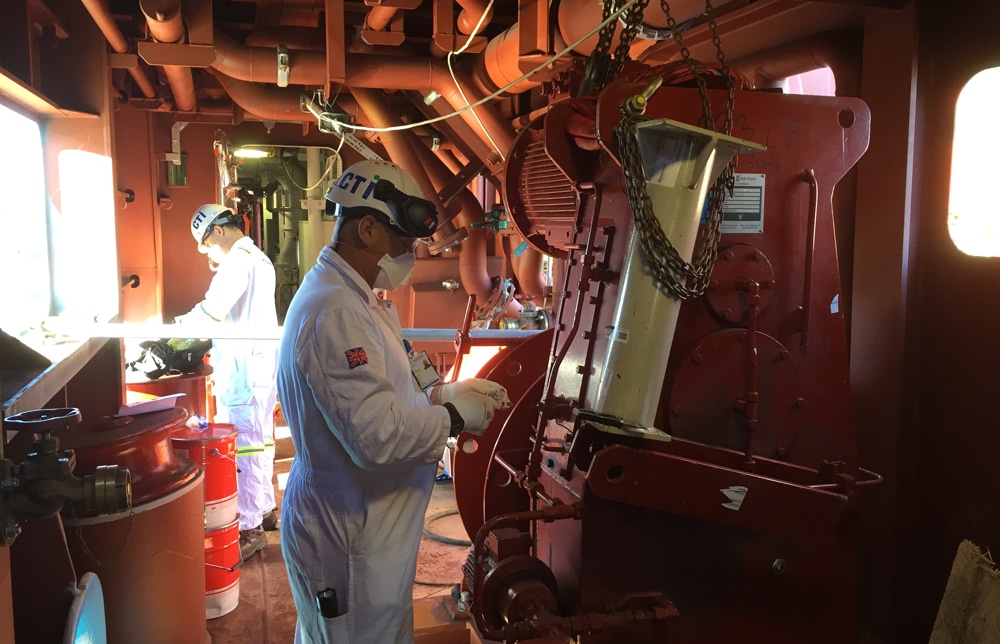By John Chillingworth of Lucion Marine*
Although asbestos has been banned from ships since July 2002, it is still very common for the material to be found in large numbers of vessels of all types. Indeed it is particularly concerning that asbestos continues to be found in a many new ships, even though the manufacturing yard may have declared the vessel to be asbestos free.
In the circumstances a key consideration for ship owners is how they can best protect themselves from this sort of situation and especially when ordering equipment and materials used in vessel modernisation, re-fit or repair programmes.

All products have to be asbestos free, and that this absolutely means 0% non-asbestos content
Given the prevalence of asbestos that remains in products and materials used in the marine sector it is clear that it cannot be enough for procurement professionals to simply state in their documentation that materials should be ‘asbestos free’.
In fact the term ‘asbestos free’ can itself be very misleading as a result of different international thresholds that govern and control its precise definition. For example, in the USA up to 1.0% asbestos content can be permissible, while in the EU it is 0.1% and 0% in Australia.
In the Far East, China has no official standard and in our work with ship owners and shipyards there we have found as much as 15% asbestos in materials that have been declared ‘asbestos free’.
This problem is compounded by the fact that there is no specific testing and certification of parts and materials by ship manufacturers or repairers.
Asbestos is typically found in whistles, pipe hangers, incinerators, boilers, deck composition and gasket materials often kept onboard in ships’ stores. As a result it can be present in and on virtually all types of military and commercial vessels, as well as in oil rigs and other floating structures.
In my experience ships built in the Far East and Turkey are more likely to have a high percentage of items containing asbestos. China is also a leading protagonist, but it is important to understand that asbestos can be present in products manufactured all over the world. For example, we discovered a 2008 Scandinavian built ship was found to have asbestos in a Norwegian built incinerator.
Consequently, because no actual testing of products, parts and component is carried out, everything is based on a manufacturer’s or supplier’s declaration. As a result, even if a newly built ship is actually asbestos free, the vessel can still be contaminated through items that are subsequently brought onboard by the owners, operators or repairers.
To avoid the risks posed by the inadvertent release of asbestos fibres into the air, ship owners and fleet management companies must ensure that their procurement departments include the proper requirements, wording and responsibilities in their standard terms and conditions of business.
As a starting point, as part of any clearly stated policy, it must be stated that all products have to be asbestos free, and that this absolutely means 0% non-asbestos content.
The terms should also highlight that during ongoing maintenance and inspection programmes undertaken as part of a ship’s Inventory of Hazardous Materials (IHM), random sampling of materials and products will be undertaken. If asbestos is detected in any part, component or material supplied to a vessel it will be replaced and the original supplier will be held responsible for its replacement and any incidental costs.
Given international differences in what ‘asbestos free’ actually means, we believe that all vessels should be compliant and consistent with the highest standards, and that 0% asbestos content should mean precisely that.
ENDS
* John Chillingworth is senior marine principal at Lucion Marine. Lucion Marine provides specialists hazardous material management services to the global marine industry and has done so for the past ten years. Supported by internationally recognised and accredited laboratories, the company works with leading owners and operators of ships, offshore platforms and all types of marine vessels, assisting in the compliance of SOLAS, the Hong Kong Convention and the EU Ship Recycling Regulations. More details at www.lucionservices.com.

